Rebecca Cheetham Nursery and Children’s Centre has achieved the Inclusive School Award with Flagship status.
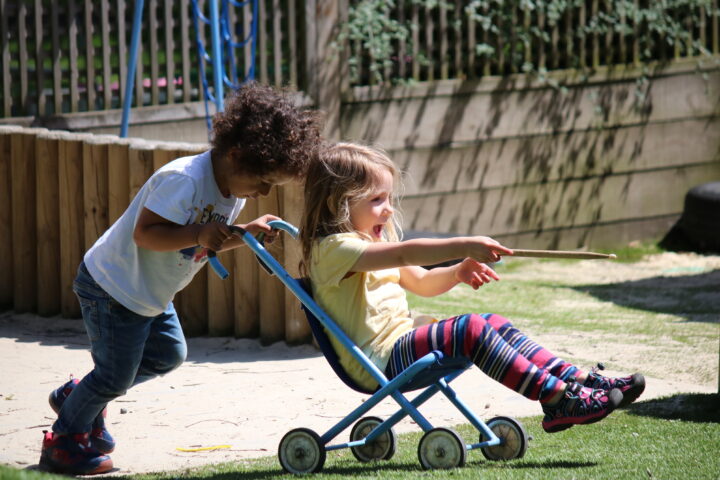
Training of Staff is a Priority
As an introduction to the day, our Assessor met with the IQM Coordinator, who is also the SENCo and part of the Senior Leadership Team (SLT) to get an overview of the day. The SENCo explained she had started out as a Teaching Assistant (TA) and then did her school/nursery based Graduate Teacher Programme (GTP) training to become a teacher. She came to Rebecca Cheetham as part of her training, and she loved the place so much she never left. She joined as a teacher in 2009 as a class teacher and went on to become SENCo a few years later. She has two days out of class to carry out her role but she clearly loves being in the classroom. The school supported her SENCo training and continue to support inclusion in every way. She told our Assessor she has a good inclusion team around her and the Headteacher supports with funding, resources and in any way he can. His commitment to inclusion is evident in the ethos and culture of the nursery. Training of staff at all levels is a priority and is ongoing.
The nursery and the children’s centre work very closely together and it is hard to see where one starts and the other one ends. Clearly, the children’s centre adds great value and additional services that the nursery can utilise. Our Assessor had a meeting with the Head of the Children’s Centre later in the day.
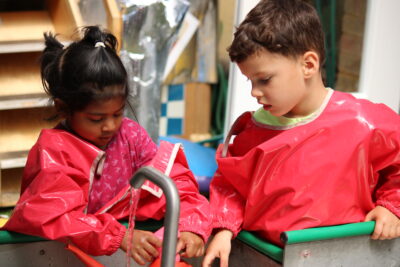
The Assessor asked how children are identified with Special Educational Needs (SEN) and when this might happen. It is rare for children to come in with an Education, Health and Care Plan (EHCP) but some may have been highlighted by Health Visitors or by others. The nursery staff then observe them closely to try to work out what barriers they face and what support they need.
Some children come from the children’s centre and they alert nursery staff to possible additional needs. Staff do many home visits to try to get to know families and children. They also work with the Complex Needs Team to help plan and deliver support for some children. One-to-one support is offered where necessary and desirable.
The nursery is very popular but they make CIN (Children in Need) children a priority for admission. The staff have a briefing every morning where they talk about children who are struggling and any problems staff want to talk about. The children are at the centre of everything that happens.
Everything That Happens Has a Purpose
There are about 50 members of staff including children’s centre staff. The IQM Co-ordinator gave an outline of the day and the way she organises the teaching and learning for her class. The 3 teachers, in 3 classrooms, do the planning for all the classes. These plans are then adapted by the teams in order to ensure they are meeting individual needs. The children mostly learn through play although this is carefully planned. There are focused activities at the start of the day and then many mindfulness activities including yoga and dance activities. Everything that happens has a purpose and the children obviously enjoy the activities.
The curriculum covers the 7 Areas of Learning identified in the new Early Years Foundation Stage (EYFS) Framework. At 9am every day the children go into designated groups, and they choose a book to read together. When they have read it, they talk about it and ask ‘deep’ questions about it. The aim is to get them to talk and to think. Teachers plan in time throughout the day to get children talking. Staff keep a record of all the new language used and learned, this helps them identify progress made.
There is a Parent Forum held every month, recent ones have been based on maths, phonics and reading. All have been well attended and appreciated by parents. They also do some of the session on Zoom so that working parents can attend.
Rebecca Cheetham is very proud to have been awarded a Wellbeing Award and there has been a lot of mental health awareness training, including training on how to support children who are suffering with anxiety and depression. Staff wellbeing is also a priority, and our Assessor was told that Rebecca Cheetham is all about wellbeing. All members of staff have a ‘check-in mate’ who they trust and who they can confide in and ask for support if they need it. There is also a wellbeing ‘change team’ and that is very proactive.
Teamwork is the Order of the Day
Teamwork is the order of the day at Rebecca Cheetham. Teams meet every day to decide on different themes and discuss different activities and children. They talk about what the children can do and what they can’t do and plan accordingly. They choose a book from around the world once a fortnight.
When children start in the nursery, they have 8 weeks to settle and they are closely observed during this time. Staff talk to parents, gather evidence that may be needed to provide additional support for SEN and video children doing different activities. This evidence is needed before they can refer for further input from external agencies.
Health Visitors usually identify children in the nursery who may have SEN following the regular 2 year old checks. Occasionally, parents/carers notice their children have some barriers to their progress and they ask the staff for their opinion and guidance.
The nursery receives SEN funding for 9 children currently and this is going up to 14 children. Each child is funded at £7,000 so interventions can be put in place very quickly.
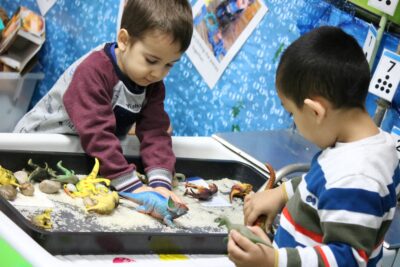
The nursery and children’s centre are part of the Tapscott Trust. However, as nursery schools are not allowed to become an academy the partnership is an unofficial one, the school has a Service Level Agreement (SLA) with the Trust. Clearly, they value this partnership and benefit from all that this brings. For instance, two expert colleagues come in and assess the children that staff have identified as possibly needing an EHCP. They complete an ‘Autism Diagnostic Observation Schedule (ADOS) Report’ that can be sent with the completed EHCP application. This helps to speed up the process.
Flagship Project
The Rebecca Cheetham Flagship Project is based on every member of staff being involved in an area of research of their choice.
This gives them the opportunity to find out more about a particular subject and to increase their expertise in one specialist field. Some of the research projects include: Autism. Behaviour support, Early Specialist support, Woodwork , Forest Schools, SEN Maths, Reading and Library.
The next meeting was with 3 colleagues who explained their experience working in the school. One is an Early Career Teacher (ECT) in first year. They said they are fully supported through weekly mentoring meetings with the Deputy Headteacher. The ECT is part of the Tapscott Trust ECT programme which holds regular meetings, this gives ECTs a chance to meet as a group.
One of the teachers explained how they plan the curriculum and do weekly plans together.
The other staff who work alongside the teacher also have an input on how the curriculum is delivered. They spoke about plans to introduce aspects of a Forest School curriculum and how they wish to involve parents/carers in experiencing learning outside the classroom alongside their children. As the school does not have its own forest area, they use the local park which is a 20 minute walk away. The teacher advised that getting them all there is a challenge in itself. One parent and one child from a household, even if they have more than one child in the school is invited. This way parents/carers have quality time with the child.
Fifteen children alongside 15 parents/ carers are taken on the walk at a time. The forest school sessions are designed to enable and encourage children as well as their parents/carers to take risks. The forest school training formed the first part of the teacher’s research project. The other aspect was about introducing woodwork and woodworking tools in the nursery classroom.
Another colleague had chosen Behaviour Management as her research topic. She has studied the Education Endowment Foundation Behaviour Management materials and research. She found this very illuminating and appropriate. She explained how this works in a nursery school, and said that children are egocentric, their toys are their toys and they don’t want to share. She said the older ones are more dominant. The have many prompts to remind them about the way to behave such as ‘hands are not for hitting’. This involves giving children a ‘time-out’ for playing rough or hitting out. The staff use a sand timer, which is for 3 minutes at most. Children can watch the time go and can use a book to talk through what happened. This helps them to understand why their behaviour was unacceptable. Each book is unique and gives them other ideas about what to do with their hands, hopefully, this will stop repetitive behaviours. Another book, ‘You are not my friend’ is also helpful when they fall out with each other. Other strategies include playing hide and seek and other games to bring children together.
Every Child is Unique
Some children get anxious when leaving the parents, this can make them feel angry or behave badly. This is why they spend time settling children in. The settling in period will be 3 days as a minimum, but it can take longer. Often, they will be fine and apparently settled in the first 2 weeks and then it hits them. Every child is different. Our Assessor was told many children arrive with ‘comfort’ toys, many are not toilet trained and many are still using dummies. Each child is unique, and it was explained, ‘we can’t label them’. They need time to settle, and they give them 8 weeks before they approach the parents to raise the problem. Often, it’s the parent who is anxious and they have to get parents to trust them and the school can signpost them to ‘Triple P’ who provide additional support. Other support classes are by the children’s centre.
 Our Assessor asked this colleague what they learned from the research. She said the main lesson was to ‘pick your battles’. So, if they keep their coat on it is not such a big deal. Staff support parents/carers as they teach their children to dress themselves and become independent. Working closely with parents is part of their job. If something is working in school and is helpful, they often suggest parents use it at home. The staff use lots of different strategies to encourage children to talk and use ‘talking envelopes’ as one resource. Our Assessor was told children are good at expressing their emotions and they use the ‘Colour Monster’ to look at talking about their emotions.
Our Assessor asked this colleague what they learned from the research. She said the main lesson was to ‘pick your battles’. So, if they keep their coat on it is not such a big deal. Staff support parents/carers as they teach their children to dress themselves and become independent. Working closely with parents is part of their job. If something is working in school and is helpful, they often suggest parents use it at home. The staff use lots of different strategies to encourage children to talk and use ‘talking envelopes’ as one resource. Our Assessor was told children are good at expressing their emotions and they use the ‘Colour Monster’ to look at talking about their emotions.
The next colleague had been researching the snack area. She said they now cut their own fruit, use safe knives and the chopping board. Today they were having hot milk, satsumas, bread sticks and cheese spread. They try to vary the snacks as much as possible and try to encourage children to try different foods.
The three colleagues were asked what they would do if they noticed a child who is always hungry and may not be properly dressed for the weather. It became clear that they know the safeguarding procedures and they know the individual children well. They said some children will only eat white food and want it separated not touching and some children won’t eat at the right times. They work with these individual needs and make adaptations and adjustments as required. They encourage parents to look at the menus on the website. Staff also have to be aware of different allergies and so have to choose snacks/foods really carefully. However, they said an allergy is not the same as a preference. There is chalk board in each classroom, which shows how much food the children are eating.
Planned Government Changes
It was a pleasure to meet the Head of the children’s centre attached to the nursery. There are very few of these amazing children’s centres left in the country and this one is an example of how it should be done. The nursery and the children’s centre have a symbiotic relationship and work in collaboration and partnership with each other. The Head of Centre is part of the Senior Leadership Team and she is the Designated Safeguarding Lead (DSL) for both. She is also the children’s centre co-ordinator for Stratford and Newham.
They talked initially about the planned government changes from children’s centres to Family Hubs and our Assessor was told they are going through transition now. There will be four Family Hubs in the borough, one has already opened but she was not quite sure what the difference was between a traditional children’s centre and a Family Hub. It is not clear how this will affect the Rebecca Cheetham Children’s Centre, but she thinks it will involve job losses and appears to be a money saving exercise. She has been through a similar transition when the demise of Sure Start some years back. There has been some Local Authority (LA) consultation and staff have been spoken with and given feedback. The consultation is looking at the whole Children’s Services. The Headteacher is very keen to keep the service on site as he understands the invaluable contribution the service makes to children’s and families.
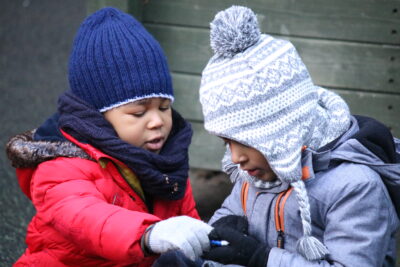
They went on to talk about safeguarding processes and policy. Our Assessor was told they use a system called SAFEGUARD (similar to Child Protection Online Management Systems CPOMS) to log everything. There is ongoing training for staff at all levels and they use staff meetings to pose safeguarding questions and there are posters everywhere showing who is on the Safeguarding Team – a team of 4. The policy has been updated to include the in Keeping Children Safe in Education (KCSIE) 2022 changes. All staff receive safeguarding training, and this includes those who may be in charge during the extended day. There is a total of 7 members of staff who have an overview of the setting. When a concern is logged on the SAFEGUARD system the one who sees it first picks it up or it may be the most relevant colleague who know the child or family well. Staff logging concerns also come and talk to one of the safeguarding team and decisions are made about what needs to be done. Staff also use a wellbeing book to record concerns as well. These help when staff are tracking smaller things to see if there is a trend for example, are they constantly coming to school in clothes that are unsuitable for the weather or are they frequently arriving hungry? The Safeguarding Team meet every week and discuss what is happening. They know the families well and they have a chat with a parent if we have concerns.
They are able to support parents and families who may be going through difficult times and can refer them to somewhere they can get additional help. The Tapscott Trust have two safeguarding managers and they do a regular joint meeting with the Trust. The Trust also do an official check of the Single Central Record. There is a lot of work and support around helping survivors of Domestic Violence and can refer to Talking Therapies. The children’s centre and the nursery have their own Child and Adolescent Mental Health Services (CAHMs) Clinician which is an amazing resource.
A Very Happy School
The next meeting was with the Deputy Headteacher who said Rebecca Cheetham is a very happy school and people like to work there. Those who do leave do so to take up other opportunities and promotion or to move out of the area. Trying to recruit staff as Early Years practitioners is increasingly difficult because they need people with very particular skills and expertise. They get lots of applications, but these are of a poor standard. This is particularly true of mid-day supervisors. The use of agency staff is now commonplace, but they have been lucky to get some very good staff members from this route. The Deputy Headteacher said that you have to love the job to do it as a lot is expected of you. You need to be dedicated to the role. This shows in the quality of practice throughout.
Talked turned to the new EYFS framework that allows for more creativity from teachers and staff and is lending itself to providing more active time with the children. She told our Assessor it is all about building relationships and having conversations with children.
The impact of the pandemic is still evident, and many children are now needing more and more support. Staff are told and are guided to ensure they are constantly talking to the children. The leadership is really important in changing the culture and the expectations of staff. The leaders are echoing the key messages all the time. The Newham Communication Strategies are very helpful for staff and these are used all the time. The Deputy Headteacher is also a reviewer for Private and Voluntary Nurseries (PVI). As such she is able to bring Early Year Leads together and to form a collaborative network. There are 7 nursery schools in Newham and the network ceased to operate during the COVID pandemic and they are having to rebuild the connections now. Rebecca Cheetham is now a Stronger Together Practice Hub. They had to apply for this title and it is about sharing the practice. Our Assessor was told, “You can’t teach something you are not doing yourself” and she says it’s a wonderful programme. Currently, they are piloting the programme before rolling it out to all PVI sectors and following that it will be rolled out nationally.
Really Good Working Relationship
 The Deputy Headteacher explained the position of the school and children’s centre within the Tapscott Trust. This is due to the fact that historically the previous Headteacher started a federation with another school and had a really good working relationship. It was a soft federation but then a primary school joined the Trust and became an academy. The CEO of the Trust asked if Rebecca Cheetham still wanted to be part of the partnership even though they could not become an academy in their own right. They now have a SLA with the Trust and get many services, a wide network and Continuing Professional Development (CPD) as part of this agreement. They benefit from buying resources in bulk and they can influence nursery practice in schools and help the Trust understand what early years looks like.
The Deputy Headteacher explained the position of the school and children’s centre within the Tapscott Trust. This is due to the fact that historically the previous Headteacher started a federation with another school and had a really good working relationship. It was a soft federation but then a primary school joined the Trust and became an academy. The CEO of the Trust asked if Rebecca Cheetham still wanted to be part of the partnership even though they could not become an academy in their own right. They now have a SLA with the Trust and get many services, a wide network and Continuing Professional Development (CPD) as part of this agreement. They benefit from buying resources in bulk and they can influence nursery practice in schools and help the Trust understand what early years looks like.
The Deputy Headteacher is an ECT Mentor this year. This is a role she is new to but is enjoying because she is learning it as she goes along. She said the programme is very prescriptive and involves instructional coaching. This is not her normal way of working but she is able to personalise it to suit her ECT who our Assessor met earlier in the day. She does an observation every week and they talk about it and identify key points. This will be reduced to an observation every fortnight when the ECT is in second year.
Compassionate Place
The school has been awarded a whole school Leads on Wellbeing Award for the second time very recently. Our Assessor was told that wellbeing of children, staff and parents and community is a sincere priority, and that Rebecca Cheetham is the most compassionate place the Deputy Headteacher has ever worked in. She said SLT invest time in supporting staff and when they are coping with issues that arise in school or in their private life. Therefore, collating the evidence for this award was not difficult. It involved an audit of wellbeing practice across the school and helped highlighted areas they needed to improve. The school is family friendly and is flexible in approach. People can talk to each other when they are feeling down or are anxious about something. The Check In Buddy system is one way to ensure everybody has someone to talk to informally. It is all about good relationships between colleagues at all levels.
All members of staff participate in the Performance Management process that happens in October. They all agree 2 targets, 1 that is directly related to the School Development Planning (SDP) and 1 target that is personal to them but is linked in some way to the school. The process is more of a wellbeing discussion. The discussions are all facilitated by the SLT and staff think they are useful and supportive and give them an opportunity to express how they are feeling and how they work.
Rebecca Cheetham has a Service Level Agreement with an organisation called SAS that provides support for staff. This allows them to access counselling and mental health advice as well of access to a GP within 24 hours. They also offer advice on diet and nutrition and this service provides good value for money.
Learning Opportunity
The Deputy Headteacher is also the staff representative on the Governing Body, and she agrees this is a learning opportunity for her where she gets the whole big picture of what is happening across the school and the children’s centre.
One of the discussions during the day was with the Vice Chair of Governors who is also the SEN Link Governor. Until fairly recently, she had 2 children attending the nursery and she wanted to give something back for the excellent provision her children had benefitted from. This is why she applied to become a Governor. She is now training to become a teacher. As a Governor she has participated in a great deal of training to help her fulfil her role. She said the Chair of Governors is experienced and well able to manage the team and there is a professional clerk provided by the Trust. There are about 6 members of the team, and they work well together. They are looking at a committee structure but currently work together and cover all areas.
The position of the nursery and children’s centre within the Trust and how the school benefits from that partnership was discussed. Our Assessor was told Rebecca Cheetham ‘piggybacks’ on to the Trust but can still stick to their own principles and values. The partnership is effective and works for them.
As a parent the Governor said her children were very happy and made great progress whilst at the nursery. They were ready to move on to school and reception class when the time came. Her partner and her were really happy with the care they received and how they developed during their time there. They learned a lot from the school that they, as parents could implement at home which has been really helpful. Her children now have an inner confidence and settled quickly in primary school.
Governors are Wholly Supportive
Governors are wholly supportive of the children’s centre and know how important it is. They fully understand the work they do supporting families and children. The children’s centre brings families together, often from all over the world and helps them to support each other. New friendships are born every day as parents/carers get to know each other and start learning from each other.
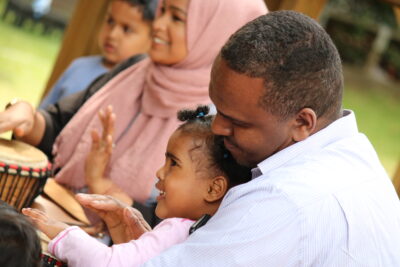
Our Assessor asked how Governors know what is actually happening all over the school and was told they visit often and receive lots of information from the Headteacher and Deputy as well as other members of staff.
There is one afternoon a term set aside as a Governors away day and staff come and tell them about what they are doing. Staff are very welcoming, and it gives them an opportunity to talk to each other and get to know each other. The Safeguarding Link Governor comes in and meets with the DSL regularly and she also meets with the SENCo and produces a SEN report to present to governors.
The next meeting was with an experienced Early Years Practitioner who works from the children’s centre. She spoke about the Early Years positive approach devised by the University of Kent. She went on a 7-week, part-time training course and had to show she could deliver the programme to parents/carers. This is for parents of children with more complex learning needs and the programme is supported through MENCAP. The referral can come from a GP or a Speech & Language Therapist (SALT) or Health Visitor. MENCAP has contact with the families and tells them where the workshop is being held.
Very Emotional Time for Parents
Parents are asked if they would like to go to a 1-off workshop or do the 8-week course. This happens every Wednesday for 2 hours every week. It’s a very emotional time for the parents and it really helps to bring them together with other parents with similar experiences so they can listen to each other and support each other. Some parents are unable to commit to the whole programme as some are working. There are some sessions run on-line but the preference is to have them all together in face-to-face sessions. The programme covers communication and behaviour as well as sleep, eating routines and patterns. It also covers how parents can look after themselves as parents. They try to concentrate on what a child can do rather than what they can’t do.
Some children already have a diagnosis, but many do not. They may have Autistic Spectrum Disorder (ASD) or Autism, some parents are in denial as its difficult to come to terms with any concerns about their children. Doing the programme and attending workshops opens up the discussion and makes it clear their child ‘is not naughty’, THAT they just have some barriers they are trying to come to terms with. The workshops provide different strategies parents/ carers can use at home. They take-away a workbook from each session that includes a task analysis and different routines to try. Parents then give feedback on how these have worked or how they have not.
Not all children come through the children’s centre and may not be known to Children’s Services, but the children’s needs are picked up either through parents/carers themselves or from Health Visitors.
The network of parents who meet and support each other is growing and the aim is for them to be more parent led in the future. There is a WhatsApp group so they can keep in touch with each other and with MENCAP workers. The course shows parents how to make visual timetables and to look for triggers to different behaviours which will be different for each child, they can then plan for it and manage it.
‘Little Talkers’
When not running and facilitating this particular programme, the Early Years Practitioner runs ‘Little Talkers’ for children with speech and language issues. This is delivered with parents and their children together and children may be referred through the children’s centre staff at the nursery. These workshops are designed to help parents/carers engage with their children. The benchmarks for speech and language are a concern as every child is different but staff know the children well and apply the benchmarks flexibly. Before parents and children are invited to participate in the course the Early Years Practitioner (EYP) will meet with the parents and the child and try to assess them to see if there are other areas of need that need to be addressed. She needs to be sure the programme is right for them. The parents’ wellbeing is taken very seriously and everything possible is done to support them.

The next meeting was with the Office Manager who is in charge of admissions and links with the community. She is also responsible for resources, finance and human resources and is part of the Wellbeing Team. She has been working at the school for over 12 years and started out as a volunteer. She is the first point of call for most contact with parents as they don’t want staff to be bombarded with queries and questions. The office staff try to answer things themselves and only go to teachers, staff, SENCo when they can’t resolve or answer something. This system works well, and they minimise the needs to make appointments. They relay the information and provide reassurance and tell parents they can call during the day and check on their child if they are worried. The office team know they are trusted by the senior team and by all staff as well as by parents/carers. This is integral to the ethos and culture of the school.
The Office Manager oversees the work and support of the two Apprentice Teaching Assistants who our Assessor was able to meet. They are both Early Years Assistants who support in class and act as key workers to named children. Both have had different experiences before they came to the school but told me they are given a lot of advice and guidance from staff at all levels. They are both doing a Foundation Degree Course as they want to become teachers. This ambition came through their performance management review and the school is very supportive of their careers. The course they are doing insists that they have to be working directly with children. They both know they have a lot of work to do to complete their course. They have a lot of independent reading to do, and they can choose their areas of research.
The Playdough Disco
All the different activities they run in classrooms and the reasons and learning behind them were discussed. Our Assessor was able to see many of the interventions happening. The Playdough Disco was particularly popular with the children and was designed to develop their fine motor skills and get them ready for the afternoon’s learning. Similarly, the Write/Dance sessions help get their bodies ready for writing.
Our Assessor was told that safeguarding training has been done and there are many reminders about what needs to be done if they have concerns about children. They are confident they know when to refer concerns. They are encouraged to report everything and the DSLs can make a decision about where the referral goes. They have been involved in some home visits but this is always done with 2 people and there is a task sheet to work from and they are properly prepared for such visits.
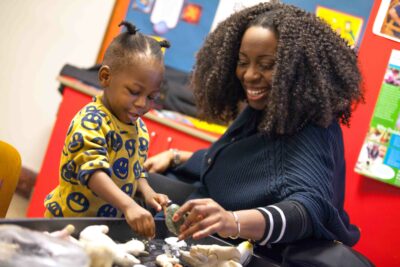
The Office Manager spoke about how proud she is of the 2 apprentices and the fact that they are doing their degrees and studying full time. She said the school does not pay the apprenticeship levy but pays the full London Living Wage. This shows they really value their staff.
Parents’ involvement in reading was discussed and the Office Manager said she had reached out to their local library; they were able to provide books which included bilingual books for parents to use with their children at home. There is a Reading Passport where parents collect a book and get a sticker when they take each book. When they get 10 stickers, they get a free book to take home and get a Library Card so they can get books regularly. Many parents have never used the library and they try to find out what the barriers are and try to find ways to overcome them. Nationally, only 49% of children are read to regularly. This is a figure Rebecca Cheetham is actively trying to improve. Reading is something that is very important to this school.
Very Proud of their School
The final meeting was with the Headteacher, but this was cut short because he was feeling unwell and was heading home. This was not a problem because his staff had told our Assessor everything they needed to know about the school. They are obviously very proud of their school and enjoy working there and will go on doing what they do, no matter if the Headteacher has gone home sick or not. This is testimony to his determined inclusive leadership that permeates every aspect of the school. He said he is confident in his staff’s ability and motivation and does not have to tell them what to do. They know what needs to be done and get on and do it.
The Headteacher wanted our Assessor to know about the Newham Learning Project that is in fact 2 different projects. One is run by the Local Authority and one by the Tapscott Trust. Between the 2 projects there is a lot of SEN training that is delivered by staff at Rebecca Cheetham. However, there is also a great deal of other training provided including team teach for every member of staff and Mental Health First Aid training. The Headteacher explained how the SLA with the Tapscott Trust works and how they get such value from the SLA. It has been a very beneficial development for the school. There is a school improvement service that that is very proactive and supportive.
The Headteacher said the school does not stand on their laurels as an ‘outstanding’ school. They are always pushing forward and always trying to get better. He said they are very critical of themselves and are very reflective. Our Assessor was told all maintained nursery schools who have bought into the service want the support of collaborating with other settings.
The Headteacher said the school received an award for sustainable citizenship and for giving children an understanding about the connections between the environment and the community. He explained they have a good knowledge of the schools around them and are aware that some schools will avoid admitting children with SEN. If all schools took their fair share of children with additional needs, then it would be easier to provide for everybody. Rebecca Cheetham won’t say no to admitting children unless they are clearly not able to meet their needs. However, they always try their best. They have to be careful of their capacity and sometimes a full day provision is not appropriate, and this may start with 15 hours. It all depends on the child and their needs.
Amazing Place to Learn
Rebecca Cheetham Nursery and Children’s Centre is an amazing place to learn, to work and to be together. Children, staff and parents/carers come together to provide an inclusive provision where they can thrive. The Headteacher provides very clear leadership and has created a culture and ethos that welcomes every child no matter what their needs.
He has ensured that this inclusive vision is communicated to all stakeholders, and they all know their part in making inclusion a reality. The staff at the school are always happy to share their expertise with others and have been doing so on many different platforms including with the IQM family of schools.
Find out more about the IQM Inclusive School Award
If your school is interested in obtaining the IQM Inclusive School Award or you wish to talk to a member of the IQM team please telephone:
028 7127 7857 (9.00 am to 5.00 pm)
or email: [email protected] for further details.
Want more information on the IQM Award? Click here to request your free IQM information pack.